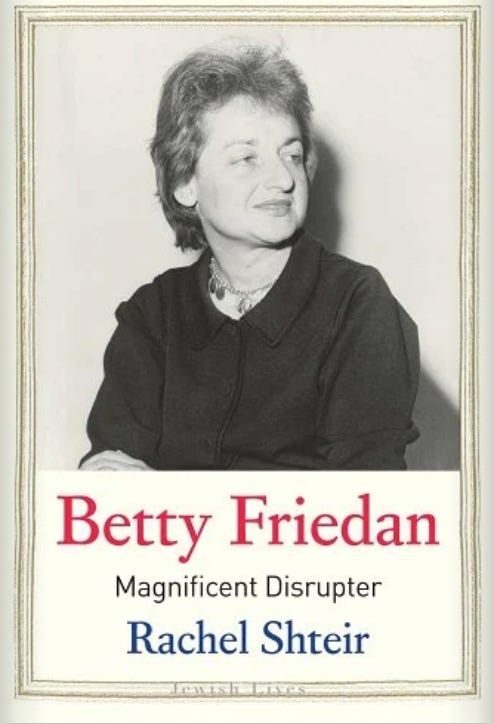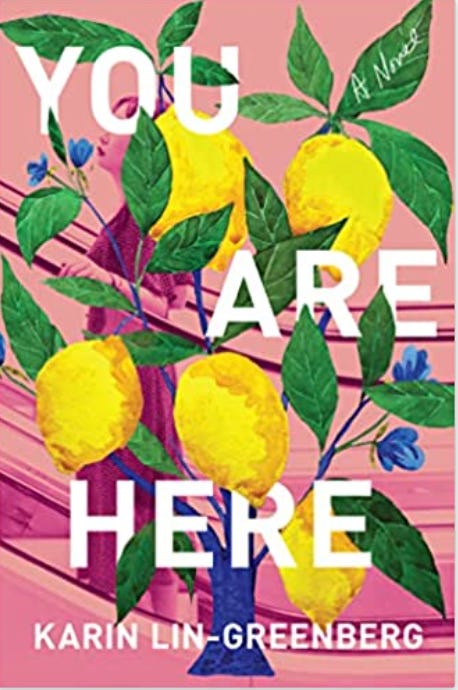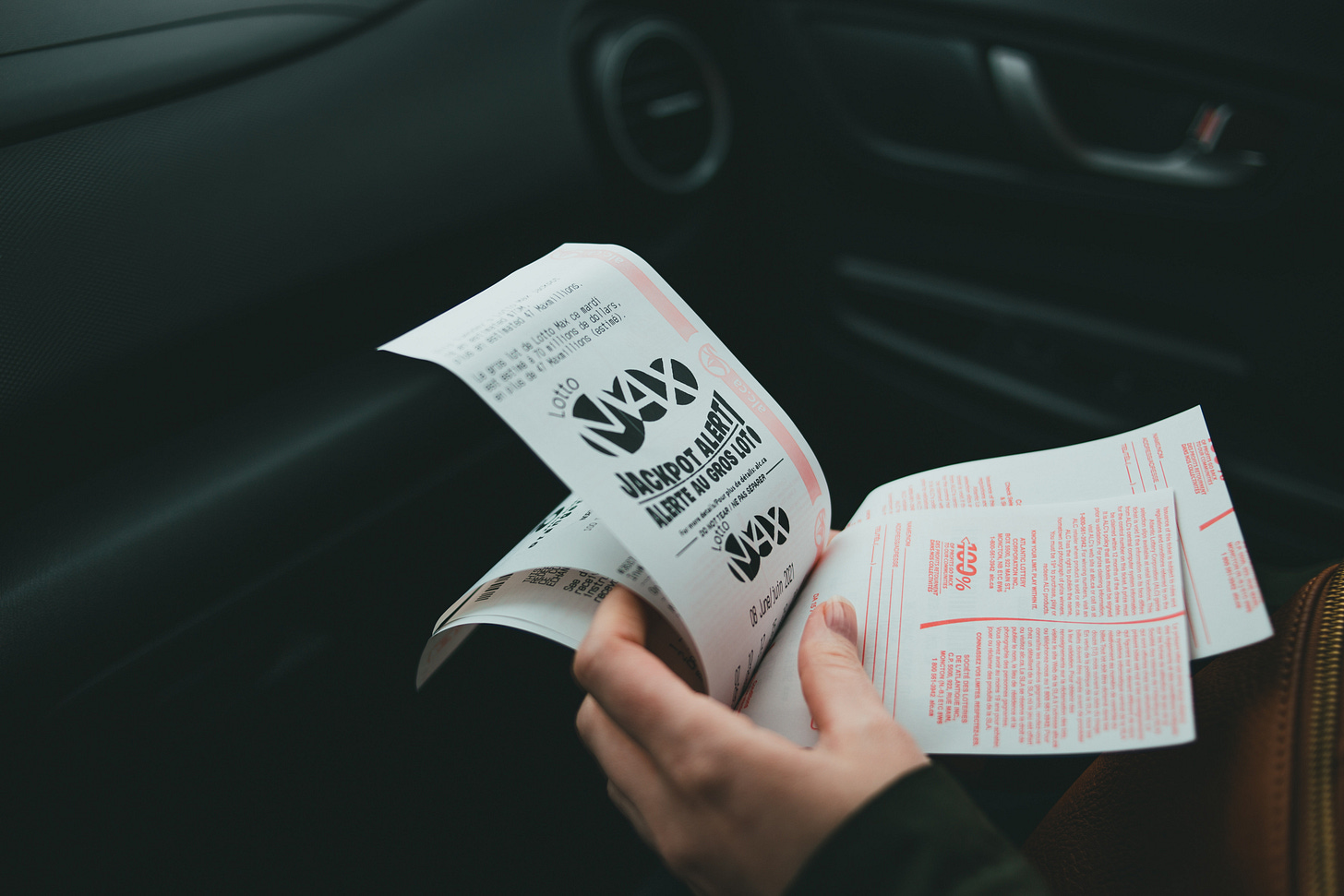Winning Lottery Numbers!
(If only! An interview novelist Karin Lin-Greenberg did with me recently about Direct Sunlight--which includes a story about a Mega Millions winner)
Happy publication day to James Reich, whose novel The Moth for the Star (7.13 Books) is out today, as is Rachel Shteir’s Betty Friedan: Magnificent Disrupter (Yale University Press)!


* Bookish subscriptions are 15% off through 9/20. 📗 *
When I talk with my friend (and fellow writer) Karin Lin-Greenberg, her cat Peanut is one of our frequent conversation topics. To give you a sense of his character, I’m sharing this New Yorker cartoon:
Karin is a gifted novelist and an award-winning short story writer. Her most recent book is the novel You Are Here (Counterpoint), published this past May, and the story collections Vanished (recipient of the Raz/Shumaker Prairie Schooner Book Prize in Fiction), and Faulty Predictions (which won the Flannery O’Connor Award for Short Fiction). ⚡️ She also won a Pushcart Prize for her story “Housekeeping,” which was originally published in The Southern Review (and is included in Vanished).
She’s long been a generous supporter of other writers, and a few months ago, she suggested we do an interview about my most recent story collection, Direct Sunlight. I’m publishing the first half today and will follow up with the other half later this fall.
Karin Lin-Greenberg: Direct Sunlight is your third story collection. What do you know now about issues such as what stories to include and leave out, how to order a collection (including which story to place first and which to place last), how to choose a title, or other matters related to writing and putting together a story collection that you did not know when you began writing short stories?
Christine Sneed: This is probably a maddening answer, but instinct is mostly what determines which of my stories go into a collection. Tone and narrative voice have something to do with it too, and I think of the stories in my collections as relatives—cousins or siblings, rather than parents and children. They’re linked thematically, and the collections’ titles were drawn from a story that appeared in each book. I aimed for a title that would bring an image to mind or at least hint at a theme.
I’m not sure if I’m any wiser about putting a collection together than I was when I began writing short stories in the early 1990s. I’m never entirely sure if what I’m doing on the page is working (you’ve doubtless heard other writers say this too). My hope is that it’s working enough to hold a reader’s attention and to inspire an emotional response, perhaps especially laughter, sympathy, affection, (self-) recognition.
KLG: Money is a concern for the characters in many of the stories in this collection. For example, in “Mega Millions,” Glenn wins an enormous amount of money in the lottery, and this creates tension between him and his wife and his children, who all believe the money should be distributed in different ways.
In “Dear Kelly Bloom,” Colin takes on a job as a newspaper advice columnist because it earns him an extra $150 a week in addition to his meager salary as an editorial assistant. This job then later leads to him having to make some difficult decisions about the advice he gives to readers.
In “Ma’am?” the protagonist, Tess, worries about how her father is spending his money (he has recently bought both a mini horse and an old school bus) and whether he’s being swindled out of it too (he is investing in a vending machine company that may or may not be legitimate). As you were writing these stories, did you think specifically about the way money–having it, not having it, how to spend it, how to share it, being swindled out of it–tied into plot and characterization?
I love this question. I was very much thinking about these matters as I wrote the stories in Direct Sunlight.
I realized several years ago that one of my main themes is financial security—or its absence, and what happens when someone has too much money and the ancillary privileges to do essentially anything they want in life. I see this as a devil’s bargain—if you can do whatever you want, who are you and how well do you treat others? And if you weren’t born wealthy and you’ve suddenly received a windfall, how does this change you, especially for the worse?
Because I don’t think sudden, inordinate wealth changes any of us for the better (or inordinate wealth, period). We might give a lot of money to charity, help out family and friends, set up a foundation, or all of the above, but what is our true character? Are we imperious, suspicious, neurotic, believing that everyone wants something from us? Would we be wrong? (I kind of doubt it.)
I’m also annoyed by how stingy the rich can be—they give the smallest percentage of their wealth to charity; some habitually undertip or underpay their employees. One of our former presidents has famously cheated many employees and contractors out of pay they’d earned.
One of my favorite lines is from the novel Lucky Jim by Kingsley Amis. One character was described as being too cheap to buy new razor blades—he’d sooner scrape up his face than part with the money for new blades. The narrator observed that he was grateful not to have the kind of relationship with money that this cheapskate does.
I do think no small part of our character is defined by how stingy or generous we are with the resources we have. Do we have a scarcity or an abundance narrative? Is it possible to achieve a balance? I think our relationship with money has a lot to do with our childhoods—did we grow up poor? Were our parents generous with us, with themselves, with others? Were they always worried about money, even if they had it? Did they not have it but carry on as if they did?
KLG: You and I share a love for animals and especially a fondness for silly animal videos on the internet. Animals are used so smartly in these stories, generally as antagonizing forces. For example, in “The Monkey’s Uncle Louis,” we see a couple without children who have adopted a poorly behaved monkey. The monkey amplifies the conflict between the monkey’s “mother” Anne and her brother Louis and sister-in-law Sandra.
There are squirrels in the walls of Jim and Kathryn’s new house in “House of Paine.” There’s even an aging mini horse housed in a suburban garage in “Ma’am?” that causes a daughter to question her father’s life choices and decisions. Can you discuss the use of animals in your stories?


CS: Animals have the advantage of being unironically who they are. When they want something, you know it; when they’re in pain, that’s generally easy to figure out too.
And there’s such great comedic potential for an animal character in a story, and so much pathos and vulnerability. The fine line between pathos and comedy has always been of interest to me as a writer, and showing human characters interacting with animal characters can be extremely revealing (and fun).
I also think we humans show our best and worst selves when it comes to our treatment of animals. As is doubtless obvious, I love putting them in stories if there seems an organic place for them.
Postscript: Sending a thank-you to Jarrett Neal, author of the essay collection What Color Is Your Hoodie? (a Lambda literary award finalist) - he moderated the Printers Row Lit Fest panel I took part in with Laura Adamczyk (most recent book, Island City) this past Saturday in Chicago.






I'm loving Direct Sunlight!
You know I’m in it to win it with this story!